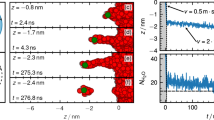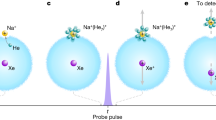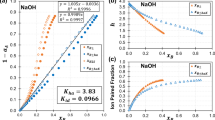Abstract
IN a recent paper1 Sir Harold Hartley and Mr. O. L. Hughes bring forward evidence for the view that “solvation (of ions) is a statistical process, the relative amounts of the two kinds of molecules (in non-aqueous solutions containing small quantities of water) being roughly proportional to the concentrations in which they are present in the solution”.This view is supported by the work of Butler2, who found that, although lithium chloride in alcohol–water mixtures is solvated preferentially by water, solvation by water is not an exclusive process.
This is a preview of subscription content, access via your institution
Access options
Subscribe to this journal
Receive 51 print issues and online access
$199.00 per year
only $3.90 per issue
Buy this article
- Purchase on Springer Link
- Instant access to full article PDF
Prices may be subject to local taxes which are calculated during checkout
Similar content being viewed by others
References
Hartley and Hughes, Phil. Mag., 15, 610; 1933.
Butler and Shaw, Proc. Roy. Soc., A, 129, 519 ; 1930.
Bjerrum, see Falkenhagen, "Elektrolyte", p. 257, Leipzig, 1932.
Martin, Phil. Mag., 8, 547; 1929.
Davies, "Conductvity of Solutions", p. 183, London, 1930.
Author information
Authors and Affiliations
Rights and permissions
About this article
Cite this article
MARTIN, A. Rôle of the Solvent in Electrolytic Dissociation. Nature 131, 584–585 (1933). https://doi.org/10.1038/131584b0
Issue Date:
DOI: https://doi.org/10.1038/131584b0
Comments
By submitting a comment you agree to abide by our Terms and Community Guidelines. If you find something abusive or that does not comply with our terms or guidelines please flag it as inappropriate.



